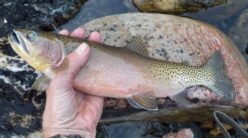A nonprofit conservation group encourages Idahoans to protest M-44 cyanide pest-control devices at information sessions planned by the U.S. Department of Agriculture’s Wildlife Services division throughout the state this week.
“Protesters will tell Wildlife Services that it must make permanent the moratorium that began in March 2017 on all use of these indiscriminate and deadly devices on Idaho lands,” Erik Molvar, executive director of Western Watersheds Project, wrote in a Monday press release. “M-44s are intended to kill coyotes, but they can also injure and kill people, pets and unintended native wildlife.”
In March, 14-year-old Canyon Mansfield and the family’s dog, Casey, were exposed to sodium cyanide after the dog accidentally triggered an unmarked M-44 device less than 300 yards away from their home.
Canyon Mansfield displayed cyanide poisoning symptoms for weeks after the exposure and Casey died within minutes of triggering the device.
Since the incident, Canyon's father, local doctor Mark Mansfield, has traveled to Washington, D.C., to petition lawmakers to make the March ban on M-44s in Idaho permanent.
Wildlife Services, a division of the U.S. Department of Agriculture, released a statement last week saying the division will host several sessions throughout Idaho this week to provide information about how the USDA complies with the restrictions on M-44 devices set by the Environmental Protection Agency.
A temporary moratorium is nice, Molvar said during a Monday phone interview, but it doesn’t solve the problem.
“The real problem is that there is no way to make these devices safe,” Molvar said. These devices are always going to be a lethal hazard. This is the 21st century, there is absolutely no reason for these things to be out in the landscape.”
In addition, Molvar said the announcement from Wildlife Services about the meetings was so filled with misdirection, spin and obfuscation that he took a crack at editing it. He provided plain-English subtitles for the bureaucratese, and told parts of the story that Wildlife Services would prefer the public not notice.
In other words, Molvar said the “spin-factor” from Wildlife Services is to convince Idahoans that additional restrictions and clear guidelines to follow those rules will be significant enough to start deploying M-44s in Idaho once again.
“A lot of people are fed up with Wildlife Services selling landmines in the Idaho and endangering the public, their pets and wildlife,” Molvar said. “There doesn’t seem to be any justification for using this barbaric technique when there are many non-lethal methods available to have livestock operations become more compatible with the native wildlife.”
Molvar said he encourages people to attend and make their views known at the sessions. They are open to the public and will take place from 7-9 p.m. in the following locations:
Tuesday, July 25, at the Lewiston Community Center at 1424 Main Street in Lewiston; Wednesday, July 26, at the Holiday Inn Boise, located at 2970 West Elder Street in Boise; and Thursday, July 27, at the Idaho State University Pond Student Union Building, which is at 1065 Cesar Chavez Avenue in Pocatello.
“We want people to know that when they come out to voice their concerns about M-44 'cyanide bombs,’ that they are not going to be alone,” Molvar said. “We want them to know we will be there to support Canyon Mansfield’s family, who has really been leading the charge to try and get these M-44’s out of Idaho permanently.”
Last week, Mark Mansfield told the Journal that Wildlife Services is focused on incorporating additional guidelines and restrictions about the use and placement of M-44 devices. That is something he said would be ineffective considering the M-44 that his son triggered was placed near his property in violation of the existing rules and conditions.
Molvar agreed with Mansfield’s statement. And Molvar believes the public has the opportunity and right to tell Wildlife Services how important it is to permanently ban M-44s in Idaho.
“I don’t think that there is anything that Wildlife Services can say that will make these cyanide bombs OK with the public,” Molvar said. “Hopefully, with these protests, Wildlife Services will get the message, free and clear, that it’s time to end this practice once and for all.”



